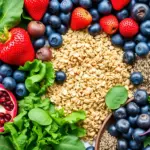Staying hydrated is essential for your health. Hydration plays a critical role in maintaining various bodily functions, from nutrient absorption to temperature regulation. Water is not only vital for life but also influences how our bodies perform in everyday activities. In this article, we will explore the basic functions of water in the body, identify the signs of dehydration, and discuss the importance of hydration for physical performance and mental wellbeing. By understanding how water affects our overall health, you’ll be empowered to prioritize hydration and enhance your well-being.
Basic Functions of Water in the Body
Transportation of Nutrients
Water plays a crucial role in the absorption and transportation of nutrients and oxygen throughout the body. It serves as a solvent that dissolves various nutrients, making them accessible for absorption in the digestive tract. Once absorbed, water helps to carry these nutrients through the bloodstream to the cells that need them, ensuring that the body functions optimally.
Temperature Regulation
One of the key functions of water is its role in regulating body temperature. When the body heats up during physical activity or due to environmental factors, sweating occurs to cool the body down. As sweat evaporates from the skin’s surface, it removes heat and helps maintain a stable internal temperature, preventing overheating and promoting overall health.
Joint Lubrication and Cushioning
Water is essential for lubricating joints and cushioning vital organs. Synovial fluid, which provides lubrication to the joints, contains a significant amount of water. This lubrication reduces friction between cartilage surfaces, allowing for smooth movements. Additionally, water acts as a protective cushion for organs, absorbing shocks and preventing injury during physical activities.
Signs of Dehydration
Physical Symptoms
Dehydration can manifest through various physical symptoms, which may include dry mouth, fatigue, and headache. When the body lacks adequate water, it struggles to maintain normal functions, leading to these noticeable signs. Recognizing these symptoms early can help prevent more severe health issues.
Cognitive Effects
Cognitive function can be significantly impacted by dehydration. Studies show that insufficient water intake can lead to decreased focus, sluggishness, and memory issues. Staying adequately hydrated is essential for maintaining mental clarity and productivity.
Long-Term Health Risks
Long-term dehydration can pose serious health risks, including kidney stones and urinary tract infections. Chronic low water intake may lead to impaired kidney function, as the kidneys rely on water to filter waste effectively. Staying hydrated plays a crucial role in preventing these health complications over time.
Hydration and Physical Performance
Impact on Exercise
Staying properly hydrated is crucial for maximizing athletic performance. Water plays a vital role in regulating body temperature, and even a small level of dehydration can significantly impair performance. Research shows that as little as 2% fluid loss can lead to decreased endurance and increased perceived exertion during exercise.
Recovery After Exercise
Post-exercise hydration is essential for efficient muscle recovery. Water helps flush out toxins and supports nutrient transport to muscles, which aids in recovery and reduces soreness. Studies indicate that individuals who hydrate adequately after workouts experience less muscle fatigue and a quicker return to normal function.
Optimal Hydration Strategies
For athletes and active individuals, it’s essential to adopt effective hydration strategies. Here are some tips:
- Pre-Exercise Hydration: Drink water before starting any physical activity to ensure optimal hydration levels.
- During Exercise: Incorporate water breaks every 15-20 minutes during intense workouts. For prolonged activities, consider electrolyte drinks.
- Post-Exercise: Rehydrate consistently after exercise to replenish lost fluids. Aim for 16-24 ounces of water for every pound lost during exercise.
By utilizing these strategies, athletes can enhance their performance and recovery through proper hydration.Hydration and Mental Wellbeing
Mood and Fatigue
Staying properly hydrated can significantly impact your mood and energy levels. Even mild dehydration can lead to feelings of fatigue, irritability, and confusion. Studies have shown that individuals who drink adequate amounts of water report feeling more alert and are less likely to experience mood swings.
Cognitive Function and Concentration
Research has demonstrated a clear link between hydration and cognitive performance. For instance, a study published in the Journal of Nutrition found that hydration status can affect attention and memory. Participants who were dehydrated performed worse on memory tasks and experienced slower reaction times. Ensuring adequate water intake can enhance focus and overall cognitive functioning.
Stress Management
Proper hydration plays a pivotal role in stress management. Dehydration can elevate cortisol levels, a hormone associated with stress. By maintaining optimal hydration, you may be able to lower stress levels and improve your overall mental health. Drinking water can serve as a simple yet effective stress-relief tool, promoting relaxation and a feeling of well-being.
Dietary Sources of Hydration
Water-Rich Foods
Incorporating water-rich foods into your diet is an excellent way to enhance hydration. Some fruits and vegetables contain high water content and can contribute significantly to your daily intake. Examples include:
- Cucumbers: Over 95% water.
- Watermelon: Approximately 92% water.
- Strawberries: About 91% water.
- Lettuce: Nearly 96% water.
- Celery: Contains roughly 95% water.
These foods not only hydrate but also provide essential vitamins and nutrients to your body.
Beverages and Their Hydration Levels
While water is the best choice for hydration, various beverages can also help maintain fluid balance. Here are some effective hydration options:
- Water: The gold standard for hydration.
- Herbal Teas: Often caffeine-free and can contribute to daily fluid intake.
- Coconut Water: Contains electrolytes and is great for replenishment.
- Sports Drinks: Useful for hydration during intense exercise but should be consumed in moderation due to their sugar content.
Understanding the hydration levels in these beverages helps you make informed choices.
Hydration Myths
There are several prevalent myths regarding hydration that can mislead individuals about their water intake:
- “Coffee dehydrates you.” While caffeine has a mild diuretic effect, coffee can still contribute to your overall hydration.
- “You only need to drink water when you’re thirsty.” Thirst is not always a reliable indicator of hydration needs, especially in hot weather or during intense physical activity.
- “Clear urine means you are well-hydrated.” While clear urine can indicate adequate hydration, the optimal shade varies based on food consumption and individual factors.
By debunking these myths, you can have a clearer understanding of how to manage your hydration effectively.
Daily Hydration Guidelines
Recommended Daily Intake
Water is vital for numerous bodily functions, and general recommendations suggest the « 8×8 rule, » which advises drinking eight 8-ounce glasses of water daily—equating to about 2 liters or half a gallon. This is a reasonable goal, but individual hydration needs may vary based on several factors.
Factors Affecting Hydration Needs
Several factors can influence the amount of water an individual needs daily:
- Age: Hydration needs can change with age, with older adults sometimes requiring more water due to decreased thirst sensations.
- Climate: Hot or humid weather can increase the need for hydration as the body loses more water through sweat.
- Physical Activity: Individuals who engage in regular exercise or strenuous activities need more water to replace fluids lost through sweat.
Tools for Tracking Hydration
Monitoring water intake can help ensure adequate hydration. There are various tools available:
- Mobile Apps: Several hydration tracking apps, such as « WaterMinder » and « MyWater, » can assist in logging daily water consumption.
- Water Bottles: Using bottles with measurement markings can help people visualize their intake throughout the day.
- Reminders: Setting reminders on smartphones can encourage regular water breaks to maintain hydration levels.
Promotion of Healthy Hydration Habits
Building a Hydration Routine
- Start your day with a glass of water to kickstart hydration.
- Carry a reusable water bottle to make drinking water convenient.
- Set reminders on your phone or use hydration apps to encourage regular water intake.
Overcoming Hydration Challenges
- Flavor water with fruits or herbs to make it more enjoyable.
- Keep water easily accessible at home and work to promote more frequent drinking.
- Gradually increase water intake if you’re not used to drinking enough.
Community and Workplace Initiatives
- Encourage workplaces to provide easy access to drinking water through water coolers or filtered dispensers.
- Organize community events focused on hydration awareness and education.
- Promote healthy hydration challenges to motivate individuals to drink more water together.
In conclusion, we explored the vital importance of hydration and how water fundamentally affects your overall health. We discussed the essential functions of water in the body, from nutrient transportation and temperature regulation to joint lubrication. Recognizing the signs of dehydration, including physical symptoms and cognitive effects, is crucial in maintaining a healthy lifestyle. Proper hydration is not only important for physical performance but also plays a significant role in mental wellbeing, influencing mood and cognitive function. We also covered dietary sources of hydration, daily intake guidelines, and ways to promote healthy hydration habits in our lives.
It’s clear that prioritizing hydration is essential for achieving optimal health and well-being. We encourage you to evaluate your hydration habits today and find ways to improve them for better health outcomes. Share your thoughts or questions in the comments below, and if you’d like to dive deeper into the topic, check out our related articles on hydration strategies and health tips. Don’t forget to subscribe to our newsletter for continuous updates and insights on maintaining a healthy lifestyle.











